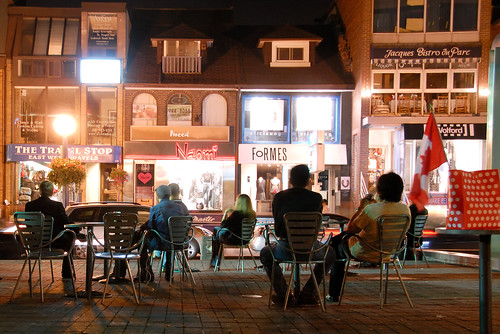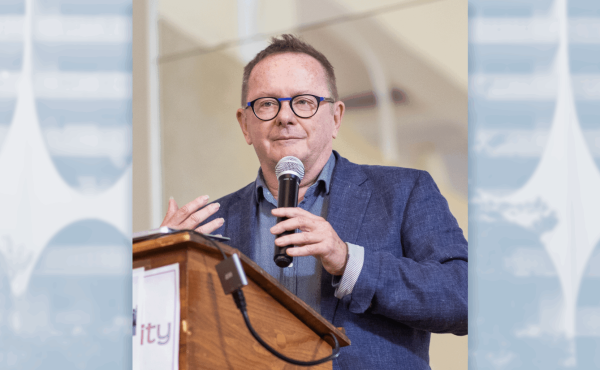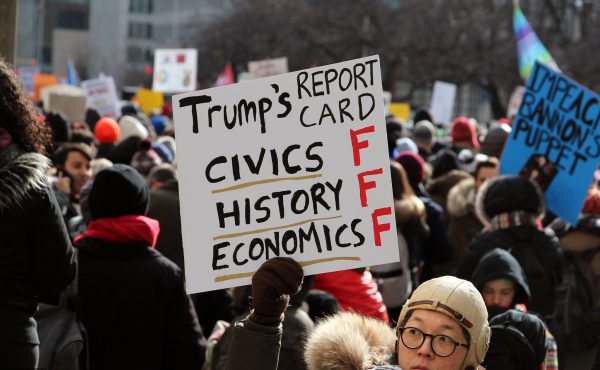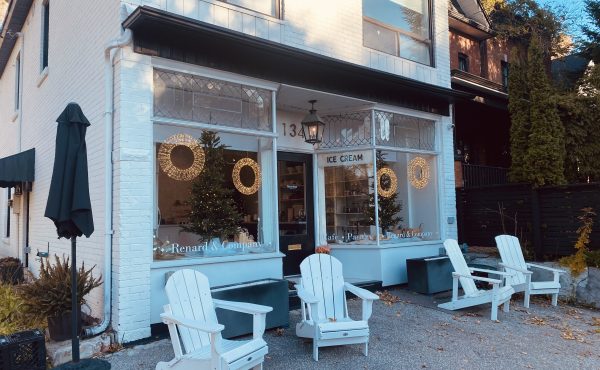
The following is a reprint of my recent Psychogeography column in Eye Weekly. Photo by Smaku.
Toronto is a city of neighbourhoods, we’re told. When they work well, they feel like a small town and, when they work really well, we might feel like Al Waxman in the opening credits of the King of Kensington, walking down the street like we own it. That’s all fine, but it gives us a false sense of the size of the city. Sometimes it’s good to be reminded of just how big Toronto is.
Try standing over an expressway. Anytime is good, but late afternoon when the rush is at its peak is best. The bottom of Dufferin over the Gardiner, right before the Canadian National Exhibition arch, is good, as is the top of Avenue Road where the 12 lanes of the 401 have been called the busiest road in North America. Every second, dozens of individual people pass by, each going to an individual home, some filled with more individuals, each with their own network of friends and coworkers. It’s a web that doesn’t stop growing, and watching the traffic and thinking this way gets overwhelming fast. Where do all these cars park? How many pairs of pants does everybody own? The numbers add up meaninglessly high.
Another rush-hour place to feel this more intimately is the Union Station basement at 4:45pm on any weekday. Try standing still in the middle of the thousands of GO Train passengers. It’s like a flash-flood mudslide and, if you don’t watch out, you’ll be swept up and taken away to Pickering or Newmarket. The mental aggregate of all this is confounding — we can see all these people, but it’s hard to know where they fit into “the city we know.” It’s too much.
Facebook helps make sense of people by organizing our networks, but do a bit of stalking of strangers — especially ones that seem to live in the same general part of town as you do — and it’s remarkable how many people you can find that have ridiculously high “friend” numbers — into the hundreds or even over a thousand — who you don’t have any friends in common with. That there is no overlap of these vast networks is as dramatic a sign of Toronto’s human depth as the 401 is.
We spend a remarkable amount of our Toronto lives in metaphorical tunnels and islands. We’ve got our social groups — the people we know — and well-worn routes between them that lead to an impression of knowing the “edges” of Toronto, but it’s an illusionary and parochial view. Toronto’s deeper than any of us can imagine, but the depth is in places we don’t pass by everyday: at Church basement meetings we don’t hear about, in North York strip-mall nightclubs not listed in this newspaper and at concerts that aren’t considered cool. Queen West hipsterland may as well be another country when viewed from Clubland. Toronto activist circles may never bump into Bay Street money folk, they just read about each other in the news. Yet it’s all Toronto.
We limit our Toronto experiences for good reason: we’d not be able to cope with knowing everything. Yet we (and I) often say “we” when describing the city and our fellow Torontonians in it. “We are despondent about the Leafs.” “We got through SARS together.” But what does that “we” mean if we have no idea or direct connection to all those people? This becomes especially apparent in an election year, when candidates try to talk directly to you, but also to 2.5 million other people. This city of small towns suddenly seems full of disparate strangers.
Princeton professor Danielle Allen, author of Talking to Strangers: Anxieties of Citizenshipsince Brown v. Board of Education , has called the relationship between complete strangers the “political friendship,” and in a 2008 talk she described it as more than just a feeling of being a “we” but a way of acting towards each other.
“One doesn’t even have to like one’s fellow citizens in order to act toward them as a political friend,” she said. “There is a very easy way of transforming one’s relations to strangers. We might simply ask about all our encounters with others in our polity, ‘Would I treat a friend this way?’ When we can answer ‘yes,’ we are on the way to developing a citizenship that is neither domination nor acquiescence.”
In Toronto, we’re relatively good at treating other people humanly. It’s a civil and gentle place as big cities go, but in this election year, when heretofore benign differences between people will be played upon as if somebody’s job depended on it, we can do better. Allen suggests the best way to improve our political friendships with each other — to strengthen Toronto’s “we” — is to improve our public conversations and talk to other people we might not otherwise talk to.
There are all kinds of ways to break out of our social tunnels and get off our islands. Twitter is over-hyped and there isn’t enough diversity on it (most people, contrary to “social media experts,” still don’t care to tweet) but it’s a fantastic way of listening to other people. But it takes some effort. The 600-plus people I follow (perhaps 2/3 of which are here in Toronto) can start to represent Toronto so often I’ll do a “nearby” search for geotagged posts (tweets people attach location data to) to see a completely different slice of Toronto with dozens and hundreds of parallel voices that until now I hadn’t heard.
I’ve started following people who are into golf, who go to monster truck rallies at SkyDome and who aren’t completely appalled by Stephen Harper. They’re into things I couldn’t imagine being into, but the medium is so intimate that I hear about worries about their sick kids and about other loves of their life and they become less oppositional and more Torontonian.
We should also approach our social life like we do restaurants, trying different things from time to time. It’s tricky: you don’t want to invade somebody else’s territory, but if you do it respectfully (and aren’t ironic about it) people are open to visitors. I’ve had some fine and wonderful conversations sitting at bars on Scarborough arterials and there’s a lot to listen to in the food courts of some of Toronto’s malls, especially smaller ones like Albion Centre up in Rexdale.
A few weeks ago, two friends and I went to a Russian sauna underneath the shopping plaza at Sheppard and Bathurst. It’s been there since the 1960s, has clocks that tell Toronto, Moscow and Tel Aviv time, and was filled with naked Russian men. We three were conspicuous at first, though we tried to fit in quietly, drinking our BYOB tallboy beers like the other men in between sweats and cold-plunges.
“We don’t get many Canadians in here,” one guy eventually said to us. Then we talked and then we laughed about things. Then they showed us how to beat ourselves with oak leaves properly by laying us on the benches and initiating us. Now, that huge Russian population that lives in Toronto that I had heard about has a few more faces and voices associated with it. It was not world-changing or a civic-epiphany, but one of many tiny steps in figuring out what “we” really means in Toronto.




8 comments
Shawn: best two sentences ever:
“We don’t get many Canadians in here,†one guy eventually said to us. Then we talked and then we laughed about things. Then they showed us how to beat ourselves with oak leaves properly by laying us on the benches and initiating us.”
This is brilliant. Thankyou.
I’ve been started at how Toronto seems like a small friendly community – much more so than any small towns I’ve lived in. However, I realize that it is only because various groups in Toronto don’t mix and I bump into the same people at various places again and again.
The downside of this is a lack of consensus on many matters. It is easy to develop extreme viewpoints when your social circle is limited to only like-minded people. I think this shows in our city politics.
I highly recommend that Russian Sauna. I go there every winter myself.:-)
andrew> We almost fainted. Such heat.
It’s the Ambassador Sauna. Was told they have occasional women’s nights too.
I was having a conversation about this with a customer of mine very recently. We were talking about Harper’s attempt at cutting arts funding. I said something along the lines of “it makes me wonder why he’s still in power…I never meet anyone who supports or admits supporting Harper”. My customer said (and I’ve been thinking about it ever since) “it’s probably because you don’t surround yourself with the type of people that support him” I had to agree with her…it’s very true. It’s been on my mind ever since and reading this article has caused me to think even more about it! A very good read, thanks Spacing:)
I’ve been to that heath club very briefly an in work related capacity, and I couldn’t quite figure out what it was at the time, and thought it was some obscure USSR themed underground lair.
As far as I recall, you go down a steep staircase, and there’s a brightly coloured red and yellow reception area with a wall with hundreds of hanging keys. Its straight out of the 1960s. Nobody was there, so to this day I couldn’t figure out what exactly it was.
It is amazing what you can find around the periphery what each person can define as their own “Toronto”. I think people would be well served to visit the inner suburbs more often. The social, cultural and political needs of the various geographic areas are more unique, and yet similar, that we assume.
When I spent four years in Montreal, I had a big social circle. When I spent three years in Tokyo, I had an enormous social circle. I am talking about real-world interactions, not Facebook or the like. I have been in Toronto for thirteen years… and I am just starting to get something of a social circle. Torontonians may not be as unfriendly as people think, but it sure isn’t warm.